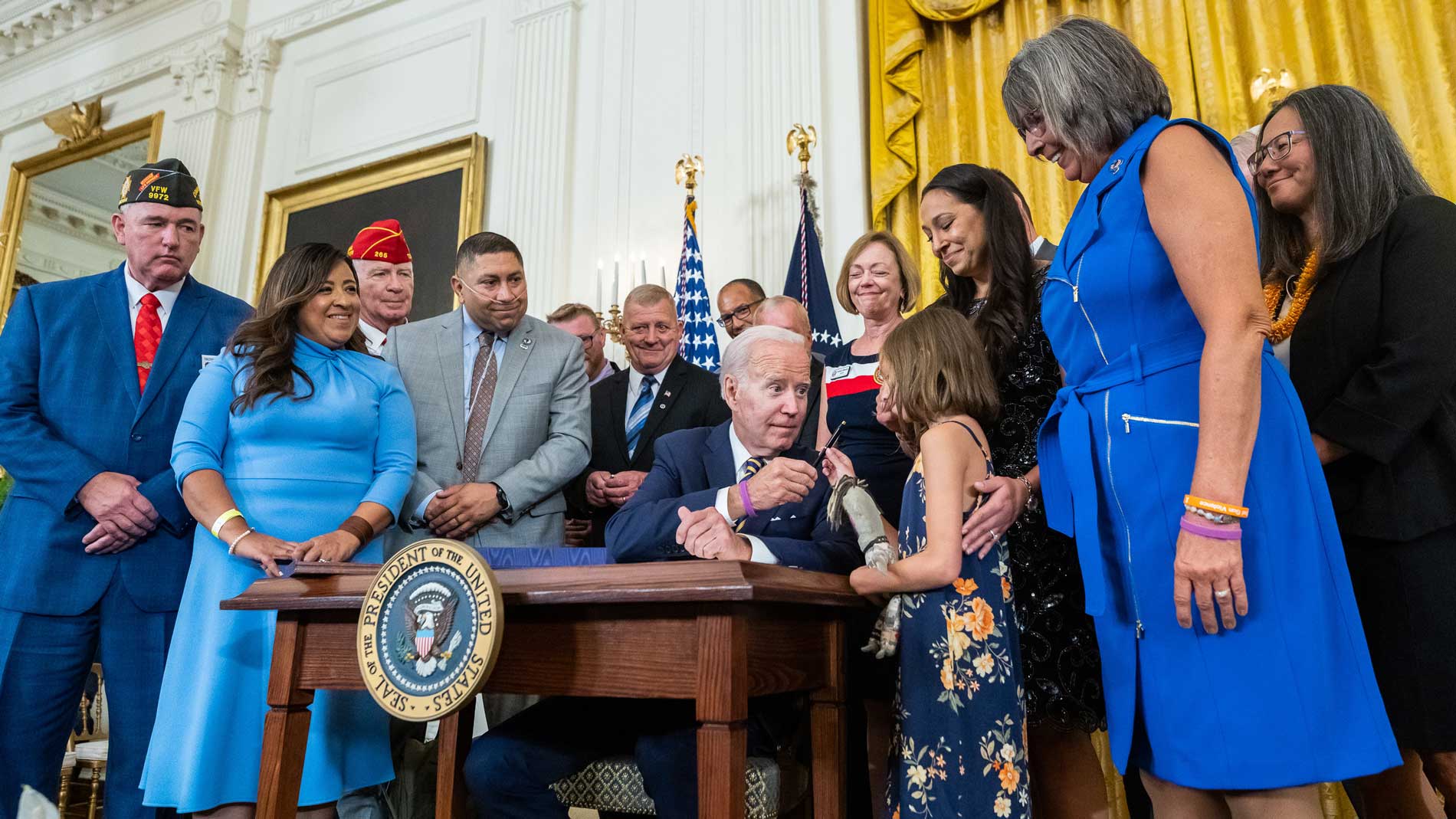87,000 Vietnam Veterans May Qualify for $844 Million in Benefits. How Come Nobody Told Them? A Report Blames VA for Failing to Notify Vets Sickened by Agent Orange. But That’s Not the Biggest Problem: A Budget Crisis is Already Threatening Payments in October to Millions of Vets
In the span of just a few weeks, Marc McCabe traveled this summer to Puerto Rico, the Dominican Republic, California, and Texas. But the 74-year-old wasn’t on an epic retirement trip.
As a pro bono veterans advocate, he was searching for Vietnam veterans and surviving family members who may be eligible for disability compensation.
McCabe, a former combat corpsman attached to Marine Corps units during the Vietnam War, has survived two bouts of cancer himself. He has been a veteran’s advocate for two decades, but his job has gotten a lot busier thanks to a spate of new legislation that has expanded benefits for millions of veterans exposed to toxic chemicals in war.
Technically, the U.S. Department of Veterans Affairs should be the ones notifying veterans when they may be eligible for new benefits—but McCabe says they often don’t.
“They’re leaving them behind,” he says.
And the Department of Veterans Affairs’ very own Office of Inspector General agrees. In an unsparing report this summer, the watchdog estimated that VA has failed to inform up to 87,000 Vietnam war veterans and their survivors that they may now qualify for retroactive compensation benefits because of exposure to toxic herbicides such as Agent Orange.

Veterans advocate Marc McCabe, far left, chats with veterans at an event this June for SecondCycle, a store that resells donations and gives the proceeds to veterans. (Photo courtesy of Marc McCabe)
If that sounds like a startling number, consider this: Those overlooked veterans and their families could be entitled to more than $844 million, the report said.
“There are millions of dollars at stake that Vietnam veterans and their survivors should be receiving,” says Bart Stichman, co-founder of the National Veterans Legal Services Program, which represents veterans in benefits appeals.
And while there is widespread agreement that America should compensate its veterans for their sacrifice and service, there’s a growing concern about where all this money will come from—especially as the cost continues to balloon thanks to the recently passed PACT Act, which added coverage for potentially six million more veterans exposed to toxins from burn pits and other sources during the Vietnam, Persian Gulf and post-9/11 wars.
America will soon owe veterans trillions of dollars in medical and disability compensation, said Linda Bilmes, a professor in public policy at the Harvard Kennedy School.
Despite the pledge, she said, “we don’t really understand the cost. … We don’t have a function that is keeping track of all of the accrued promised benefits the way we should.”
Facing a record budget shortfall, VA may be unable to pay benefits to millions of veterans as soon as October.
Promises Broken
In 1986, Stichman and other lawyers brought a class action lawsuit against VA on behalf of Vietnam veterans and survivors. The resulting consent decree required the department to recognize “presumptive conditions” for Vietnam veterans—illnesses that VA assumes are caused by exposure to Agent Orange during military service—and pay disability and death payments to those who suffered from these ailments.
VA “hate the fact they ever agreed to it. So they try to think of every possible reason they don’t have to do what they should do.”
—Bart Stichman, special counsel at the National Veterans Legal Services Program who sued VA on behalf of veterans in a landmark case known as Nehmer vs. The Department of Veterans Affairs
The decision was contentious. In 1989, Sen. Alan Simpson, a Wyoming Republican, questioned the science connecting Agent Orange exposure to veterans’ health problems and told Sen. Ted Kennedy on a radio program that providing coverage for presumptive conditions was “political pandering to powerful special interest groups.” Kennedy called Simpson “Agent Orange Al.”
By 2021, the scientific evidence was clear, linking Agent Orange to even more illnesses. The National Defense Authorization Act that year expanded the list of presumptive conditions for Vietnam veterans. There are now more than 20 of these conditions, including bladder cancer, lung cancer, prostate cancer, and more. But critics say VA has always been resistant.
“They hate the fact they ever agreed to it,” says Stichman. “So they try to think of every possible reason they don’t have to do what they should do.”
When the list of presumptive conditions was expanded in 2021, VA announced that it would send letters to all Vietnam veterans who were previously denied benefits to let them know they may now be eligible. But using a statistical analysis of VA health records, the Inspector General report found VA may have missed nearly 90,000 people. The report also estimated each veteran was missing out an average of $372 a month.

McCabe, who volunteers with the nonprofit Vietnam Veterans of America, said he has helped more than 800 veterans and survivors file benefits claims or appeals since the list of presumptive conditions was expanded in 2021. Even if a veteran gets a letter that they may be eligible for benefits, McCabe says the technical jargon that VA uses is confusing for veterans, who are often in their 70s and 80s. When it comes to Agent Orange benefits, he said, the agency is simply “not explaining it well enough.”
A Fragmented System
One of the problems is the fragmented nature of the Department of Veterans Affairs, which has multiple large branches that are tangled in bureaucracy. Disability payments for veterans are governed by the Veterans Benefits Administration, while the actual health care is done at the Veterans Health Administration.
Brent Arronte, the VA’s Deputy Assistant Inspector General for Audits and Evaluations, said the reason the estimated 87,000 letters were never sent comes down to who has “custody” of a veteran’s health information. The Office of Inspector General said a veteran should automatically be notified about benefits if they have a diagnosis for a presumptive condition in the Veterans Health Administration system of records. The Benefits Administration disagrees.
Its interpretation, Arronte says, is that veterans should only be notified about benefits if their health records are already included in a claims folder in the Benefits Administration system. But Arronte says, “that shouldn’t make a difference.” If the records are already in the Veterans Affairs system, he says, “we think that they should look at these veterans to see if they do require readjudication and possibly back pay and earlier effective dates.”
One of the recommendations in the June report was that the Benefits Administration send out new letters to tens of thousands of Vietnam veterans and their survivors who may have been overlooked. Yet the Benefits Administration took the unusual step of disagreeing with the recommendation. “My best guess is that they know this is going to create a lot of rework,” Arronte says.
He says that the Benefits Administration is currently under enormous strain from the 2022 passage of the PACT Act, one of the largest expansions of veterans benefits in history. It led to a massive VA hiring surge to keep up with new claims.

In 2022, President Joe Biden signed the PACT Act, clearing the way for benefits for millions of veterans sickened by toxins from burn pits and other sources. (Photo by Erin Scott/The White House)
And after a long fight from advocates, VA also decided in August to make medically unexplained chronic multisymptom illness, also known as Gulf War Illness, a presumptive condition for more than 15,000 veterans—known as K2 vets—who served at the Karshi-Khanabad Air Base in Uzbekistan.
“They really don’t need another 87,000 dumped into their lap,” Arronte says. “But our opinion is we are here to make sure veterans are made whole.”
VA wouldn’t respond to questions from The War Horse about the report, instead referring to a memo from Joshua Jacobs, Department of Veterans Affairs under secretary for benefits.
He said that the Office of Inspector General “repeatedly mischaracterized” VA’s obligation. Jacobs wrote that the Inspector General’s interpretation “is at odds with the text of the consent decree, its enforcement history in the courts, and the parties’ understanding of the agreement.”
A Bubble on the Horizon
The $844 million that the VA may owe Vietnam veterans may be hard for the department to come by. That’s because it is facing one of its biggest financial crises ever, driven by the millions of veterans who are owed compensation for their service-related disabilities.
In July, VA told members of Congress that the department was facing a budget shortfall of $15 billion across the remainder of 2024 and 2025, raising the ire of House Committee on Veterans’ Affairs Chairman Mike Bost, an Illinois Republican. He blamed “horrendous, top-to-bottom mismanagement” for the massive deficit. It’s the largest budget shortfall in the department’s history, and VA is attributing it to increased costs caused by the PACT Act.
Award-Winning Journalism in Your Inbox
This budget shortfall means that 7 million veterans and their surviving family members are at risk of not receiving benefits payments as soon as Oct. 1. But $15 billion is only a drop in the bucket compared to the startling costs the department faces in the coming years.
“Veterans benefits always peak long, long after a war is finished,” says Bilmes.
While last year the VA paid out about $143 billion to about 6 million veterans, Bilmes estimates that the U.S. owes more than $2 trillion in medical and disability benefits to veterans just from the wars in Iraq and Afghanistan.
“It is a staggering amount,” she says. “These are benefits that have been promised to people but not paid out yet. It’s not speculative.”

U.S. Army Sgt Henry E. Heath loads a C-123 Ranch Hand aircraft for defoliation during the Vietnam War. (Photo courtesy of National Archives)
In fact, the 2023 Financial Report of the United States Government, compiled by the Department of the Treasury, lists veterans benefits as one of the country’s most significant financial liabilities.
Suzanne Gordon, a senior policy analyst at the nonpartisan think tank Veterans Healthcare Policy Institute, says that the U.S. has the resources to fulfill its commitment to veterans.
“We’re a very rich nation,” she says. “There’s no question that we can afford it. The question is, ‘Why don’t we want to afford it?’”
Bilmes says that previous U.S. wars were paid for by increasing taxes and government budget cuts to nonwar spending. But since 9/11, she says, “we’ve paid for all our wars entirely through borrowing,” which has been one of the factors driving up the national debt.
One of Bilmes’ suggestions is to create a trust fund for veterans in order to safeguard the promised money and plan for how much is needed. We have “a huge bubble here that is on the horizon,” she says, which is rapidly becoming bigger thanks to expanded presumptive benefits.
Our Journalism Depends on Your Support
For Gordon, the answer is straightforward. “If we can afford war, we can afford to take care of our veterans,” she says. “And if we can’t afford to take care of veterans, then we shouldn’t engage in wars that are often elective and nonessential to the defense of the nation.”
Mark Jackson, a K2 veteran and board member at the Stronghold Freedom Foundation, says money is a constant conversation when it comes to veterans’ benefits. But VA’s focus on money can end up commodifying the lives of veterans.
“If you make this about money, it’s no longer about lives, it’s no longer about service,” he said. “It becomes a line item that makes it a whole lot easier to say no.”
‘It Will Change My Life’
Though the Veterans Benefits Administration hasn’t agreed to send out letters to the approximately 87,000 Vietnam veterans who may be owed benefits, the agency did agree to create a working group to study how it can improve the ways it identifies potentially eligible veterans. Arronte says for now, the Inspector General office will hold the agency to account by requesting an update on the working group’s progress every 90 days.
Meanwhile, McCabe won’t be out of a job anytime soon. He plans to continue to travel across the country, hosting local town halls to talk to Vietnam veterans and survivors about their eligibility for benefits. Just recently he helped Susan Meyer, the widow of Vietnam veteran Henry Meyer, appeal the denial of her husband’s claim for bladder cancer that was filed 10 years ago—two years before he passed away from the disease.
“I’m not looking for the money,” says Meyer, who lives in Fort Myers, Florida. “I’m doing it for my husband.”
She said that it’s difficult to only get the claim approved after her husband has passed away, when he was the one who served. Still, she says, “it will change my life.”
This War Horse investigation was reported by Leah Rosenbaum, edited by Mike Frankel, fact-checked by Jess Rohan, and copy-edited by Mitchell Hansen-Dewar. Coverage of veterans’ health made possible in part by a grant from the A-Mark Foundation.
Seven Steps to Find Out If You Qualify for Agent Orange Benefits
1. Determine if you or your family member served in a location that was exposed to Agent Orange.
a. For example, if you or a family member served for any length of time between January 9, 1962, and May 7, 1975, in the Republic of Vietnam, aboard a U.S. military vessel that operated in the inland waterways of Vietnam or on a vessel operating not more than 12 nautical miles seaward from the demarcation line of the waters of Vietnam and Cambodia.
b. There are other locations that are eligible as well, including locations in Thailand, Laos, Cambodia, Guam, Johnston Atoll, Korea and on some bases in the US. For a full list of locations and times see this page.
2. Determine if you or a family member have a health condition caused by Agent Orange exposure. There are over 20 conditions that are now considered “presumptive” — the government automatically assumes they were caused by Agent Orange. They include certain cancers, high blood pressure, type 2 diabetes, Parkinson’s disease and more. For a full list of the eligible conditions, see this page. You can be diagnosed with a presumptive condition by any doctor; it doesn’t have to be a VA doctor or at a VA health facility.
3. File a disability claim online, by mail, in person at your regional VA office, by fax or with the help of an accredited Veterans Service Organization. You will need to submit medical records of your health conditions and military records to show your dates of service.
4. If your condition was denied in the past but is now considered a presumptive condition due to the National Defense Authorization Act of 2021 or the PACT Act, you can file a supplemental claim.
5. If your claim is denied, you can request a new review of the case through a higher-level review. You have to request this review within one year of the initial decision date.
6. If your claim is denied or your higher-level review is denied, you can also request a board appeal. A Veterans Law Judge will review your claim. You also have to request this review within one year of the initial decision date.
7. If your claim gets denied and you are confused on how to proceed, you can ask a Veterans Service Organization to help you. Many organizations offer services for free to veterans. Look for an accredited organization in your state, or if you are a Vietnam veteran or survivor diagnosed with bladder cancer, hypothyroidism or parkinsonism and the VA did not grant you disability or death benefits for one of these diseases since Jan 1, 2022, you can reach out to the National Veterans Legal Service Program at agentorange@nvlsp.org.
— Leah Rosenbaum





Comments are closed.